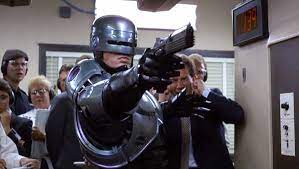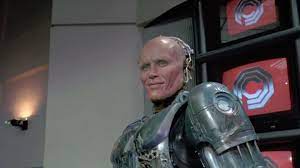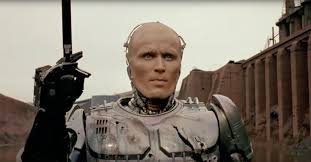RoboCop (1987)

RoboCop (1987) Review: A Sci-Fi Masterpiece with Social Commentary
Introduction Paul Verhoeven’s RoboCop (1987) is more than just an action-packed sci-fi movie—it’s a sharp satire of corporate greed, media influence, and law enforcement. Blending ultra-violence, dark humor, and a tragic hero’s journey, the film remains a classic in both science fiction and action cinema. This review explores the film’s plot, performances, themes, and cultural impact while incorporating SEO-friendly keywords such as “RoboCop 1987 review,” “best sci-fi action films,” and “Paul Verhoeven movies.”
Plot Summary Set in a dystopian future where crime runs rampant in Detroit, RoboCop follows Alex Murphy (Peter Weller), a dedicated cop brutally murdered by a ruthless gang. Revived as RoboCop by the mega-corporation Omni Consumer Products (OCP), Murphy becomes a high-tech enforcer programmed to uphold the law. However, as he begins to recall memories of his past life, RoboCop embarks on a mission to reclaim his humanity and take down both the criminals and the corrupt executives behind OCP’s sinister agenda.
Peter Weller’s Performance as RoboCop Peter Weller’s portrayal of RoboCop is iconic, balancing the mechanical coldness of a cyborg with the buried emotions of a man struggling to remember his past. His robotic movements, deep voice modulation, and subtle facial expressions add layers to his character, making RoboCop one of the most memorable sci-fi protagonists.
Supporting Cast and Villains
- Kurtwood Smith as Clarence Boddicker: One of the most sadistic villains in sci-fi history, Smith’s performance as Boddicker is menacing, delivering brutal one-liners and embodying pure chaos.
- Ronny Cox as Dick Jones: The perfect corporate antagonist, Cox portrays Jones as a power-hungry executive whose greed fuels OCP’s unethical experiments.
- Nancy Allen as Anne Lewis: As Murphy’s former partner, Allen delivers a strong performance, providing emotional grounding to RoboCop’s journey.
Themes of Corporate Control and Media Satire
- Corporate Greed and Corruption: OCP’s plans to privatize law enforcement reflect real-world concerns about capitalism’s unchecked influence.
- Loss of Humanity: RoboCop’s struggle to regain his identity mirrors philosophical debates on AI and consciousness.
- Media Manipulation: The film’s satirical news segments highlight the desensitization of violence in society and the power of propaganda.

Action and Special Effects RoboCop is filled with unforgettable action sequences, from RoboCop’s crime-fighting debut to the final showdown with ED-209. The use of practical effects, including Peter Weller’s suit design and stop-motion animation, enhances the film’s gritty realism.
Cultural Impact and Legacy Beyond its box office success, RoboCop has influenced countless films, TV shows, and video games. The character became a pop culture icon, spawning sequels, reboots, and even a television series. The film’s themes remain relevant, making it a staple in discussions about AI, law enforcement, and corporate ethics.
Final Verdict RoboCop (1987) is a sci-fi action masterpiece that blends explosive entertainment with intelligent social commentary. With an unforgettable lead performance, a gripping story, and thought-provoking themes, it remains a must-watch for fans of the genre.










